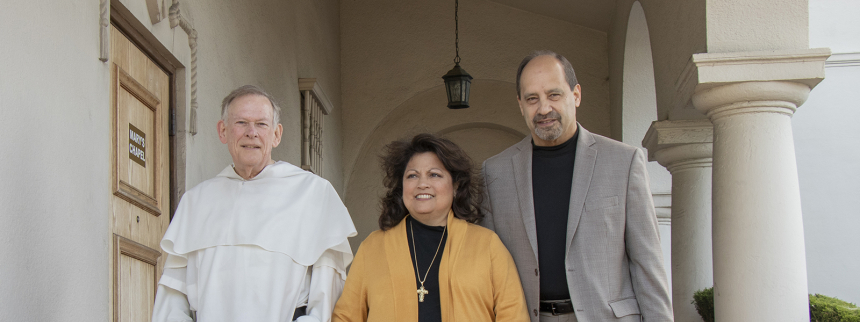
(In photo above, Dominican Father Michael Sweeney, left, walks with Deacon Errol and Julie Kissinger at St. Basil Parish in Vallejo.)
Laypersons by virtue of their baptism have apostolic dignity and are made participants in Christ’s mission.
Vatican II and subsequent papal documents, such as Pope John Paul II’s apostolic exhortation, Chrisifideles laici (December 1988), on the vocation and mission of the laity in the church and the world, have laid out a vision of the church’s mission that focuses on shared responsibility among laity, religious and clergy “to bring the Gospel to the world,” says Dominican Father Michael Sweeney.
Father Michael has devoted himself to putting these teachings into action. He is the founder and executive director of the Lay Mission Project, a lay formation program based since 2016 in the Diocese of Sacramento. The project is designed to equip lay men and women to bring the light of Christ into their families, secular professions and communities.
A native of Vancouver, B.C. he was ordained in 1979, and has served as both a pastor and a university chaplain. From 2004 to 2005, he was president of the Dominican School of Philosophy and Theology in Berkeley.
In 1997, he co-founded with Sherry Weddell, a laywoman, the Catherine of Siena Institute (www.siena.org), a formation program whose purpose is to assist parishes in lay formation. He served as co-director for seven years, during which time he offered workshops on discernment and the theology and formation of the laity to ordained and lay Catholics throughout the United States and Canada, in Indonesia and Rome.
To date, the institute has addressed more than 100,000 Catholics throughout the world, including laypeople who have participated in the Called and Gifted Discernment Process workshops in various parishes of the Diocese of Sacramento to assist them in discerning their charisms.
Father Michael’s chief interest is the mission of the church to the world, he shared in a recent interview with Catholic Herald magazine. He notes this requires an understanding of the relationships within the church between the clergy, the laity and the parish community in light of that mission, and formation of the laity for their task as apostles, co-responsible for the church’s mission.
In recent talks he has concluded that "the current crisis of the church can only be resolved through a new paradigm centered upon the redemptive mission of Christ" and shared by all regardless of status.
Three features that distinguish shared responsibility are equal responsibility among clergy, religious and laity in the church’s mission, an equal voice in discerning that mission and real accountability, Father Michael notes. One challenge to any long-lasting change has been how laity imagine the church, because that influences what they feel they can do, he adds.
“The imagination of the church has been dominated by the care of souls,” he says, leading to a church where “essentially the laity are to be cared for.” Rather than canonical or institutional changes, drawing out the lay vocation first requires formation. “To change a paradigm, it’s necessary to change relationships. We need laity who are capable of partnering with pastors for the church’s mission.”
He says the Lay Mission Project is unique in that laypeople are made aware of taking the church’s mission into their professions, in order to evangelize the culture. “We put a huge emphasis on discerning your own vocation as part of the church’s mission,” he notes. Participants examine “how their own gifts, talents and circumstances in life can determine the manner in which they are going to exercise the mission.”
Participants are placed in small faith communities for learning, praying together and sharing in discussion. “Conversation, prayer and taking counsel together is an integral part of formation,” Father Michael says. “It becomes extraordinarily important and opens up the possibility of common initiative as well.”
Year One of the Lay Mission Project focuses on “Vocation: Ecclesial and Personal.” Year Two focuses on “Church Teaching and Witness.” Year Three focuses on “Practical and Specialized Application.” Each year begins with a retreat with all participants.
Each participant in the Lay Mission Project takes courses online, meets regularly with his/her small faith community, and in the final year of three has a “capstone” project that can be a practical ministry project or an extensive reflective essay on how he/she will take what they have learned to help evangelize the culture.
Father Michael hopes that Lay Mission Project participants, when they complete their coursework this month, will share their knowledge with their pastors, ministry leaders and fellow parishioners.
“What laypersons require in formation is to live their faith in their profession or business and in their relationships,” he says. “These lay leaders will be in a good position to offer encouragement and instruction to other laity of their communities in a way they couldn’t before.”
LEARN MORE
About Father Michael Sweeney and the Lay Mission Project at www.scd.org/laymission.

